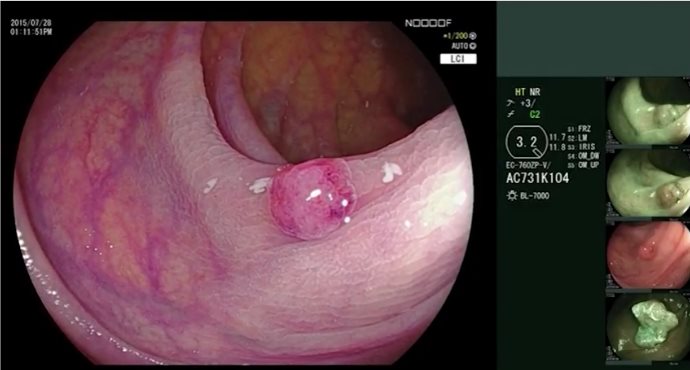Although there are rules for when to stop colorectal cancer screening, there are no rules about when to stop surveillance colonoscopy in patients with precancerous
Kolon
Kolon
Should Older Adults With Adenomas Continue Surveillance Colonoscopy?
Depressed Lesions Are Different at a Histologic and Molecular Level
In a study from Japan, T1 colorectal cancers and adenomas were classified as “depressed,” “flat,” or “protruded” subtypes. Depressed lesions constituted only 1.2% of all
Early Colorectal Cancer Screening in African Americans: High Uptake and High Yield
Recommendations from GI societies to screen African Americans for colorectal cancer (CRC) starting at age 45 were based largely on age-related incidence and mortality data
Granular Laterally Spreading Tumors With Nodule: Rectal Location and at Least 4-cm Size Warrant en Bloc Resection
Granular laterally spreading tumors (G-LST) in the colorectum are more common than nongranular lesions, less likely to have cancer, and in general, easier to remove
Delayed Start Times Associated With Reduced Adenoma Detection
Previous studies have shown that the adenoma detection rate (ADR) is sometimes lower in colonoscopies performed in the afternoon versus the morning, though the results
Surgery Not Needed After Complete Endoscopic Resection of Intramucosal Colorectal Cancer
Intramucosal cancer (IMC) refers to dysplasia in the lamina propria of the mucosa with or without invasion of the muscularis mucosa. Such lesions are usually
Initial Experience With EndoRotor Tissue Resection Device
The EndoRotor nonthermal powered endoscopic debridement (PED) instrument (Interscope, Inc., Whitinsville, Mass) is a new tissue resection device that can be passed through endoscopes. There
ESGE Expands the Postpolypectomy Cohort With No Recommended Surveillance
The European Society of Gastrointestinal Endoscopy (ESGE) has issued its first update of postpolypectomy surveillance recommendations since 2013. Key recommendations include the following: Patients with
Adding Time for Inspection During Colonoscope Insertion Does Not Work
There remain occasional advocates of dedicated time during colonoscope insertion to look for polyps as a way of increasing detection. In this analysis of 7
Invasive Amöbiasis im Kolon
Invasive Amöbiasis im Kolon mit Ulcerationen im rechten Kolon
Polypenklassifikation: BASIC
Die BASIC Klassifikation von Kolonpolypen bezieht sich auf das Blue Laser Imaging System von Fujifilm und bedeutet BLI Adenoma Serrated International Classification.
Paris-Klassifikation: Kolorektale Frühkarzinome
Die Paris-Klassifikation für oberflächige/ frühe Tumoren gilt für den gesamten Gastrointestinaltrakt. Im Kolon gibt es jedoch noch zusätzliche Charakteristika, die es zu berücksichtigen gilt.
Endoskopische Resektion von großen Kolonlipomen-Prozedur und Outcome von zwei Fällen
Lipome des Kolons sind subepitheliale, benigne Tumoren. Eine Entfernung ist sinnvoll bei rezidivierende Blutungen oder einer Obstruktionssymptomatik durch Größenwachstum.
Wie finde ich sessile serratierte Adenome?
Flache Polypen sind schwer zu finden und werden vielleicht auch leichter übersehen, vor allem im rechten Kolon, wo der Grad an Sauberkeit manchmal begrenzt ist.
Endoskopische Diagnostik von Colonpolypen anhand der NICE Klassifikation
Die neue Generation des elektronischen Endoskopie-Systems von Fujifilm ermöglicht neben der Zoom-Endoskopie eine virtuelle Chromoendoskopie. Das Blue Laser Imaging (BLI) ermöglicht ähnlich dem Narrow-Band-Imaging eine
Perforation einer blutenden Polypektomiestelle im Colon mit einem Hämoclip
Gezeigt wird die Therapie einer postpolypektomie Blutung. Hierbei kommt es zu einer Perforation der Darmwand, die endoskopisch mittels Klipp verschlossen werden kann.















